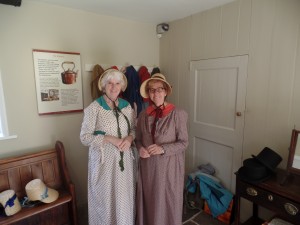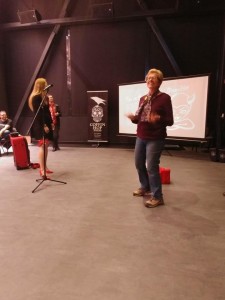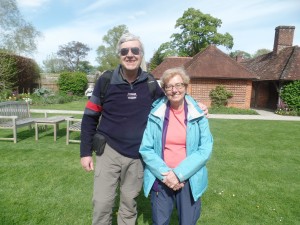![IMG_7973[25371]](http://susancalder.com/wp-content/uploads/2018/07/IMG_7973253711-300x225.jpg)
All posts by admin
Shakespeare & Ten Days in Summer
Today on my publisher’s website I blog about my recent visit to Shakespeare’s Globe Theatre in London.
Also, good news for Ten Days in Summer. My publisher, BWL Ltd., participated in a special Kobo sale that ran over the Canada Day long weekend. Kobo advised us that three BWL titles made the top 5 best sellers in the promotion:
Ten Days in Summer (9781772994056): 56 Units
Brides of Banff Springs (9781772992717): 36 Units
The Deepest Dark ( 781771452090): 22 Units
Jane Austen’s House

For those who missed it, here’s my post that appeared on my publisher’s website on June 12th.
| Susan & Barb at Jane Austen’s home, which was later divided into flats – hence the boarded up windows and door alterations |
I’ve loved Austen’s writing since I studied Pride and Prejudice in high school English. I subsequently re-read the novel several times, watched numerous film versions of it and read all of her other books. Emma is my second favourite. Barb is not a romance reader and had never been drawn to the stories, but she offered to drive us to Chawton. We began our visit to Jane Austen’s former home with a picnic in her garden.
At the Austen home, we learned that Jane had already drafted her novels when she moved there at the age of 34. Content in this improved environment, she started work on revisions. Another brother, who lived in London, submitted her first polished manuscript to a publisher. Sense and Sensibility by A Lady was published in 1811 to public and critical acclaim. A bedroom in the museum displayed an advertisement for her second novel: Pride and Prejudice by the author of Sense and Sensibility. We asked a volunteer guide why Austen had published anonymously. The guide said that the novel was a fairly new written form at this time. Poetry was the viewed as the only true literary writing, while novel writers were considered somewhat sketchy, especially women writers. The guide added that Austen was known as the books’ author in literary circles, but the public was kept in the dark.
| Jane’s writing table, more suitable for quill pen writing than a laptop, stands in front of the grandfather clock. |
Jane Austen went on the publish the rest of her novels while living in the Chawton house. The guide believes that Jane would have continued to live there and write more books if she hadn’t become ill and needed to be closer to a hospital. Jane died too young, at age 41 in 1817, probably of Addison’s disease or stomach cancer.
 |
| Jane Austen, 1775-1817 |
The tour left me with the impression that Jane Austen lived a mostly happy life, enhanced by close family connections, friendships and writing satisfaction and success. But her own story shows the constraints for women of her time, forced to carve a fulfilling life in a world skewed toward men. Her novels reflect this experience and may be one reason why they still resonate with people today.
We finished the tour on a fun note–dressing up in period clothing. The next day Will and I left for London. Barb sent us an email saying the visit had inspired her second venture into Austenland, by reading a non-fiction history of Jane Austen’s time. Who knows? Jane might have picked up a new fan.
Carpooling with Paul
This week’s segment of Carpool Karaoke on the Late Late Show with James Corden brought back memories. Especially memories of my holiday last month in Liverpool, where I visited many of these same sights, but without Beatle Paul McCartney by my side. I even enjoyed a drink at the Philharmonic bar, where Paul performed in the video to a surprised and enthusiastic audience. Later this summer, I plan to write blog posts about my tour of Paul’s and John Lennon’s boyhood homes, as well as stops at Liverpool sites such as Penny Lane and the Cavern Club. It was a truly fab experience for a Beatles’ fan.
Jane Austen’s Home
My husband Will and I spent a delightful month of May in England and Scotland. We chose this destination because 40 years ago we went to the UK on our honeymoon. Some of our activities this time were repeats–climbing to the dome of St. Paul’s Cathedral and taking a day trip to Windsor, which was preparing for the wedding of a young couple. But most of our sights were new.
In addition to being a month that re-energized me, the trip provided material for my regular blog posts on my publisher’s website. During the next months these posts will focus on my encounters with places associated with British authors. First up is Jane Austen.
When Words Collide is Coming Up!
![20170812_174435[16424]](http://susancalder.com/wp-content/uploads/2018/05/20170812_17443516424-e1524326090324-225x300.jpg)
Why is When Words Collide my favourite? Here are my top ten reasons.
1. WWC is local, here in Calgary. I don’t have to spend money on airfare, hotels and restaurant meals to attend, although I might grab a bite with friends on the hotel’s Boomtown pub patio.
2. Not only local, WWC takes place close to my home. The festival hotel, the Delta Calgary South, is about a 15 minute walk or short drive away. I can come home for dinner or a breather from the activities.
3. Being local, I constantly run into people I know at WWC and don’t feel out of place.
4. But there are still tons of new people to meet. Writers, readers, editors, publishers and agents from Calgary, other parts of Canada and beyond.
5. I met my publisher at WWC: Jude Pittman of BWL Ltd.
6.. The Energy. This is what impressed me the most at my first WWC, the inaugural year of 2011.
7. The opportunity to promote and sell my books. Any registrant can volunteer to sit on a panel or do a presentation, and sell their books in the merchant’s corner, either on the shared author’s table, a table they or their group rent or through Owl’s Nest Books, the official bookseller.
8. It’s fun. The banquet photo above says it all and it’s not unusual to see people dressed in various costumes during the daytime. The year that author Diana Gabaldon was a Festival Guest of Honour a man showed up at her session wearing a kilt, in homage to her novel hero Scottish nationalist Jamie.
9. Learning. I’ve been around writing a long time and still learn more about writing and selling books at the many panels and presentations I attend.
10. The registration cost is $45-$60 ($30-$40 for seniors and students) for three full days and two evenings of programming. I can’t resist a bargain!
When Words Collide
![20170812_175147[16416]](http://susancalder.com/wp-content/uploads/2018/04/20170812_17514716416-300x225.jpg)
Song, Dance & The End of the World

I had fun this week at the launch of Sarah L. Johnson’s first novel, the apocalyptic Infractus, released by Calgary’s Coffin Hop Press. My name was drawn for one of the door prizes. Winners had to come up to the front of the auditorium and lead the audience in a sing-a-long, with lyrics posted on a giant screen. We drew our prizes from a grab bag of items related to the novel. I won a Holy Bible, autographed by the author. My seatmate got a toy dragon.
An Evening with William Deverell
![AEA-2018-Shortlists-Calgary[23827]](http://susancalder.com/wp-content/uploads/2018/04/AEA-2018-Shortlists-Calgary238271-300x200.jpg)
The evening will feature a one-on-one conversation between award winning Canadian author William Deverell and Crime Writers of Canada Prairie Director, David Poulsen (Cullen and Cobb Mysteries). William Deverell, a successful trial lawyer and creator of the acclaimed CBC series Street Legal, will also read from his latest Arthur Beauchamp novel, Whipped, and answer audience questions. Throughout the evening western Canadian crime writers Jayne Barnard, Susan Calder, Dwayne Clayden and R.M. Greenaway will announce this year’s Arthur Ellis Awards finalists. The event will be capped off with a 35th anniversary celebration of the Crime Writers of Canada – with cake!
Free. Everyone welcome
What is a Novel Chapter?
![WorldAway_CO[1]](http://susancalder.com/wp-content/uploads/2018/03/WorldAway_CO11-300x234.jpg)






